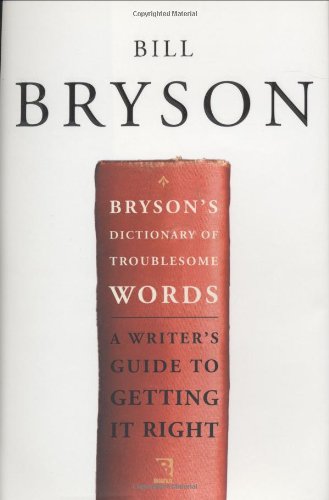Articoli correlati a Bryson's Dictionary of Troublesome Words

Sinossi
One of the English language’s most skilled and beloved writers guides us all toward precise, mistake-free usage.
As usual Bill Bryson says it best: “English is a dazzlingly idiosyncratic tongue, full of quirks and irregularities that often seem willfully at odds with logic and common sense. This is a language where ‘cleave’ can mean to cut in half or to hold two halves together; where the simple word ‘set’ has 126 different meanings as a verb, 58 as a noun, and 10 as a participial adjective; where if you can run fast you are moving swiftly, but if you are stuck fast you are not moving at all; [and] where ‘colonel,’ ‘freight,’ ‘once,’ and ‘ache’ are strikingly at odds with their spellings.” As a copy editor for the London Times in the early 1980s, Bill Bryson felt keenly the lack of an easy-to-consult, authoritative guide to avoiding the traps and snares in English, and so he brashly suggested to a publisher that he should write one. Surprisingly, the proposition was accepted, and for “a sum of money carefully gauged not to cause embarrassment or feelings of overworth,” he proceeded to write that book–his first, inaugurating his stellar career.
Now, a decade and a half later, revised, updated, and thoroughly (but not overly) Americanized, it has become Bryson’s Dictionary of Troublesome Words, more than ever an essential guide to the wonderfully disordered thing that is the English language. With some one thousand entries, from “a, an” to “zoom,” that feature real-world examples of questionable usage from an international array of publications, and with a helpful glossary and guide to pronunciation, this precise, prescriptive, and–because it is written by Bill Bryson–often witty book belongs on the desk of every person who cares enough about the language not to maul or misuse or distort it.
Le informazioni nella sezione "Riassunto" possono far riferimento a edizioni diverse di questo titolo.
Informazioni sull?autore
<b>Bill Bryson</b> is the author of numerous works of travel literature as well as books on language. In addition to his bestselling books for Broadway, including <i>A Walk in the Woods, I’m a Stranger Here Myself, </i>and <i>In a Sunburned Country</i>, he is the author of <i>Mother Tongue</i>, <i>The Lost Continent</i>, <i>Notes from a Small Island</i>,<i> </i>and <i>Neither Here nor There</i>. He lives in Hanover, New Hampshire.
Le informazioni nella sezione "Su questo libro" possono far riferimento a edizioni diverse di questo titolo.
Compra usato
Condizioni: molto buonoEUR 5,49 per la spedizione da U.S.A. a Italia
Destinazione, tempi e costiCompra nuovo
Visualizza questo articoloEUR 38,22 per la spedizione da U.S.A. a Italia
Destinazione, tempi e costiRisultati della ricerca per Bryson's Dictionary of Troublesome Words
Bryson's Dictionary of Troublesome Words
Da: ThriftBooks-Dallas, Dallas, TX, U.S.A.
Hardcover. Condizione: Very Good. No Jacket. Missing dust jacket; May have limited writing in cover pages. Pages are unmarked. ~ ThriftBooks: Read More, Spend Less 0.86. Codice articolo G0767910427I4N01
Quantità: 1 disponibili
Bryson's Dictionary of Troublesome Words
Da: ThriftBooks-Atlanta, AUSTELL, GA, U.S.A.
Hardcover. Condizione: Good. No Jacket. Missing dust jacket; Pages can have notes/highlighting. Spine may show signs of wear. ~ ThriftBooks: Read More, Spend Less 0.86. Codice articolo G0767910427I3N01
Quantità: 1 disponibili
Bryson's Dictionary of Troublesome Words
Da: ThriftBooks-Reno, Reno, NV, U.S.A.
Hardcover. Condizione: Good. No Jacket. Pages can have notes/highlighting. Spine may show signs of wear. ~ ThriftBooks: Read More, Spend Less 0.86. Codice articolo G0767910427I3N00
Quantità: 1 disponibili
Bryson's Dictionary of Troublesome Words
Da: ThriftBooks-Atlanta, AUSTELL, GA, U.S.A.
Hardcover. Condizione: Good. No Jacket. Pages can have notes/highlighting. Spine may show signs of wear. ~ ThriftBooks: Read More, Spend Less 0.86. Codice articolo G0767910427I3N00
Quantità: 1 disponibili
Bryson's Dictionary of Troublesome Words
Da: ThriftBooks-Dallas, Dallas, TX, U.S.A.
Hardcover. Condizione: Good. No Jacket. Pages can have notes/highlighting. Spine may show signs of wear. ~ ThriftBooks: Read More, Spend Less 0.86. Codice articolo G0767910427I3N00
Quantità: 1 disponibili
Bryson's Dictionary of Troublesome Words
Da: ThriftBooks-Phoenix, Phoenix, AZ, U.S.A.
Hardcover. Condizione: Very Good. No Jacket. May have limited writing in cover pages. Pages are unmarked. ~ ThriftBooks: Read More, Spend Less 0.86. Codice articolo G0767910427I4N00
Quantità: 1 disponibili
Bryson's Dictionary of Troublesome Words
Da: ThriftBooks-Atlanta, AUSTELL, GA, U.S.A.
Hardcover. Condizione: As New. No Jacket. Pages are clean and are not marred by notes or folds of any kind. ~ ThriftBooks: Read More, Spend Less 0.86. Codice articolo G0767910427I2N00
Quantità: 1 disponibili
Bryson's Dictionary of Troublesome Words
Da: ThriftBooks-Dallas, Dallas, TX, U.S.A.
Hardcover. Condizione: Very Good. No Jacket. May have limited writing in cover pages. Pages are unmarked. ~ ThriftBooks: Read More, Spend Less 0.86. Codice articolo G0767910427I4N00
Quantità: 1 disponibili
Bryson's Dictionary of Troublesome Words
Da: WorldofBooks, Goring-By-Sea, WS, Regno Unito
Paperback. Condizione: Good. The book has been read but remains in clean condition. All pages are intact and the cover is intact. Some minor wear to the spine. Codice articolo GOR002927651
Quantità: 1 disponibili
Bryson's Dictionary of Troublesome Words
Da: WorldofBooks, Goring-By-Sea, WS, Regno Unito
Paperback. Condizione: Fine. Codice articolo GOR008824102
Quantità: 1 disponibili

